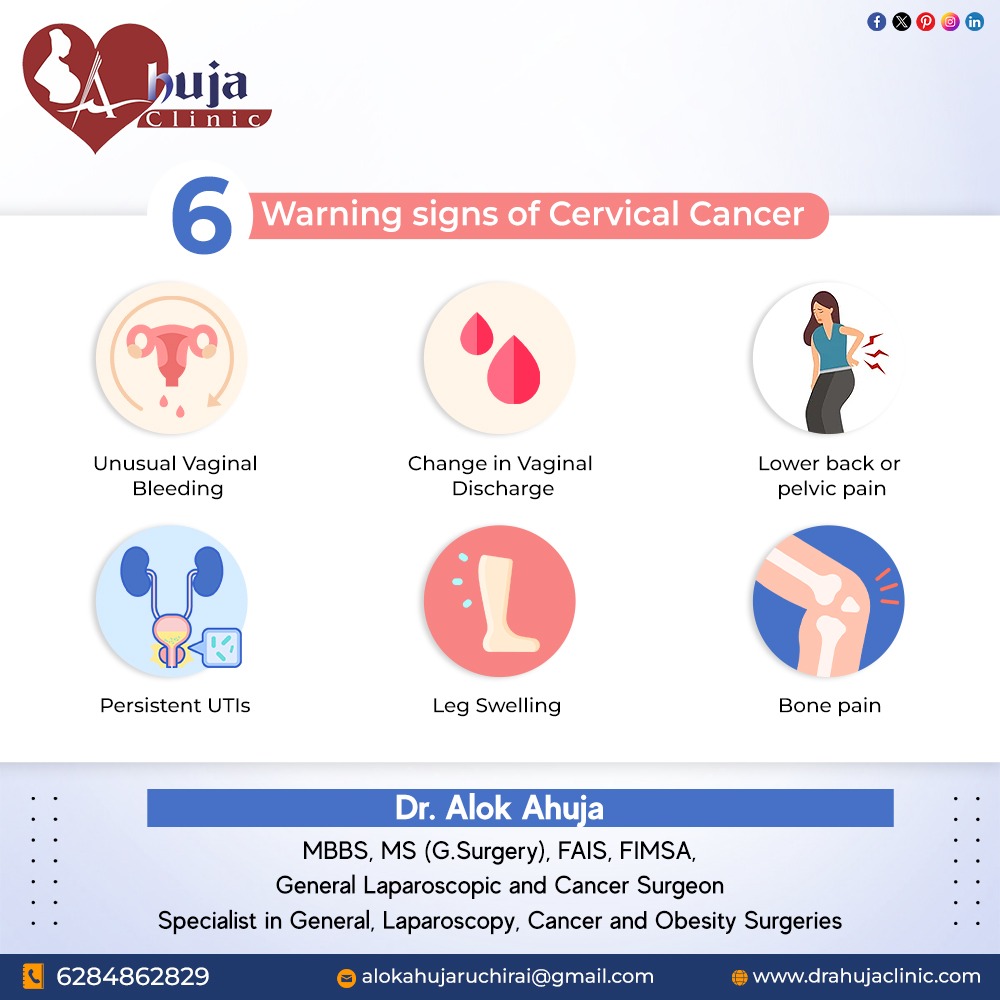Blog

Usually Cervical cancer shows no symptoms as it develops slowly over time. Before it appears in the cervix, there are some changes in cells of cervix that are called dysplasia, it is a process in which abnormal cells start to appear in the cervical tissue.
If these abnormal cells are not destroyed or removed, they become cancer cells and start spreading deeply into the cervix and its surrounding areas which makes the condition severe.
One can reduce the risk of having cervical cancer by taking screening tests and receiving a vaccine that protects from HPV( human papillomavirus) infection.
Here Dr Ahuja Clinic research team listed 6 Warning signs of cervical cancer:

It is reported that, Most of the time, early cervical cancer shows no signs at all because it Usually, takes 15–20 years for infected cells to convert into cancer cells, but in some cases like untreated HIV, a weaker immune system, this can be faster and take only 5–10 years. Still, some common warning signs should not be neglected and can be taken as the early signs of cervical cancer. Here is the list of 5 warning signs of cervical cancer.
Vaginal bleeding that is uncommon for a female body, such as during or after intercourse, during periods or after menopause, or heavier than typical cycles, could be a sign of advanced cervical cancer. Unusual longer and heavier flow of Menstrual bleeding
Women with cervical cancer find changes in their bowel and urine habits. Their desire to urinate may become more intense and regular, and if the nature of stools changes over time, it may indicate that the cancer has spread to the kidneys, bladder, or colon.
Although vaginal discharge is conventional the kind of discharge you get may be a sign of Cervical cancer if it causes a foul-smelling discharge that might be pink, brown, or crimson in appearance. that may be heavy and have a foul smell with blood in it.
Tumor growth in tissues and reproductive organs might cause pain during sexual activity and Pelvic pain that doesn’t correlate with regular menstrual cycle could be a sign of advanced cervical cancer in a woman. The discomfort may be confined in one spot or distributed throughout the pelvic region, mild or severe.
If the cancer spreads to your liver, you may have an enlarged belly. Additionally, cancer cells can prevent lymph fluid from going away. This could result in an accumulation of fluid and swelling in your legs or abdomen.
Moreover, If it was not a benign tumour and started spreading on the surrounding area of the cervix. Then it is a malignant type of cancer that affects the other parts of the body also.
In that case, The following will be Symptoms of advanced cancer.
There are two types of cervical cancer based on the type of cell in which it occurs.
HPV is the most common cause of all types of cervical cancer passed through sexual contact; it can be cancerous or benign which means if it is spreading to the other parts of the body apart from where it originated then it is malignant and on the opposite of this if the tumour is affecting its originated area only and not harming or spreading any other part of the body then it is the benign type of cancer.
The stages range from 1 to 4. The starting number means it is in the cervix only. As the numbers increase, it becomes more advanced. Stage 4 cervical cancer means it is grown and involved in nearby organs or spreading in the body.
Imaging tests – In this test, they make pictures of the body. It can easily specify the location and size of the cancer. Tests may include X-ray, MRI, CT and positron emission tomography scans.
Visual examination of bladder and rectum – A doctor uses special scopes to look for the signs of cancer inside the bladder and rectum.
To diagnose cervical cancer other tests to find out the extent of the cancer may be needed. They use the information from staging tests to plan treatment. Treatment depends on various factors, such as the stage of the cancer, health conditions and your preferences—surgery, radiation, chemotherapy etc.
Cervical cancer is not a common illness; those symptoms can be neglected. If you or you heard someone talking about these signs ask them not to wait for the symptoms to become more severe and to visit a specialist.
Copyright © 2025 Dr Ahuja Clinic. All Rights Reserved | Marketing by : WebHopers
Website Design by CSW Technologies